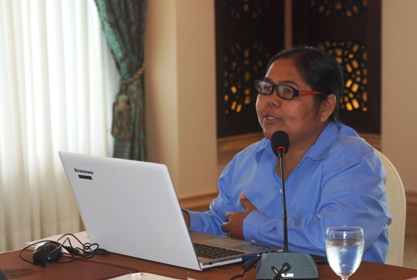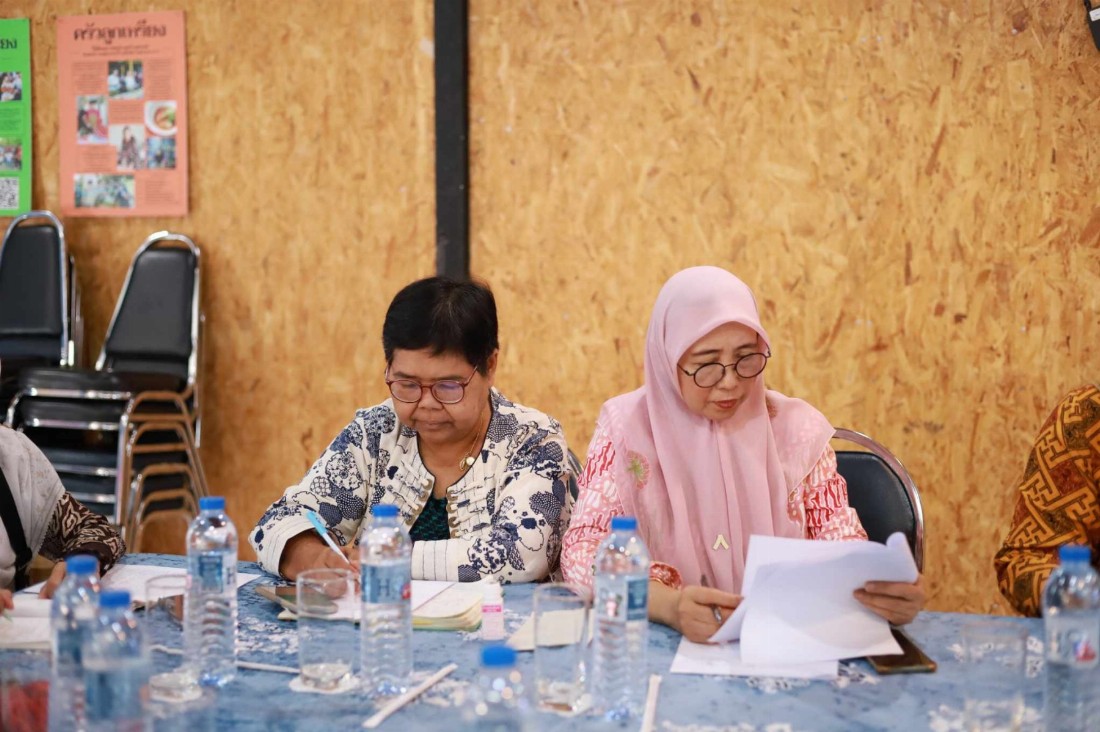thailand - prevention, peacebuilding
Ms. Lamai Manakarn

- Actor/Organisation
- Ms. Lamai Manakarn / Civil Society Council of the Southernmost Thailand (CSOST)
- Current Title/Designation
- Chairperson
- Expertise/Focus Area
- Women and CSO participation in peace process
- Date of Interview/Research
- 13 August 2024
- Location of Interview
- Zoom Application
- Diplomacy Track
- 2
Starting Point
Ms. Lamai or Phi Lamai (Sister Lamai) affectionately called by the local people of the south is a Thai Buddhist woman in her mid-50s. In the 2000 Lamai was an activist working mostly in the area of environment and community protection for the southernmost provinces. Her interest in justice and equality has driven her to engage in and advocate for various issues faced by the locals in the southernmost region. Being born and raised in Songkhla and Pattani and witnessing various forms of violence, loss of life, and the grief of the families of the victims, Lamai decided that she had to do something to stop this wicked violent circle.
In 2013 Ms. Lamai started to engage with a local Buddhist NGO Buddhist Network for Peace-B4P. Working under B4P has made her one of the leading female Buddhist activists in the area. Ms. Lamai’s key attribute is her open-mindedness and ability to work with people from different ethno-religious backgrounds. She is well respected by the Muslim community and is also regarded as a crucial peacebuilder in the eyes of the state authorities and international organisations.
At present, Ms. Lamai serves as the first female chairperson of CSOST. She started her new role in June 2024. Under her leadership, CSOST will still work on the area of decentralisation, conflict transformation, and conflict management at the community level as well as the civil society’s participation in the formal peace process. More importantly, she would like to see CSOCT work more on the issues promoting the local community’s resilience. Her leadership style is to enhance power-sharing between women and men with consultation strategies. She believes that by having her as the chairperson, CSOST will be viewed as a less male-dominant entity, but more as a platform of co-working between people of diverse backgrounds who wish to see peace flourish in the southernmost region.
Peace Journey
In 2015 Ms. Lamai together with other female representatives of 16 civil society organisations of the southernmost region formed a female working group known as Peace Agenda of Women (PAOW) to advocate for more women’s participation in the peace process and to propose a gender-sensitive approach for conflict transformation in the region. Paow later comprised 23 organisations in which women played key roles in the leadership positions. In April 2015 Lamai and other key PAOW leaders proposed to the Thai state and the representatives of Barisan Revolusi Nasional (BRN) the idea of a Safety Zone for the three southernmost provinces. In the eyes of women, a safety zone is not a safe house where a member of an insurgent group would stay under the care of the state. The safety zone is a public space—be it a market, school, or playground—where women, children, and families frequent regularly and enjoy quality time together. The idea of a safety zone was picked up by the conflicting parties and later there were 5 safety zone plans to be jointly implemented by both parties as one of the trust-building activities between the two. However, the plan was scrubbed within a year after that.
Although the PAOW proposal was not successfully carried out, it is marked as the first concrete step the women of the South took to play more of a role in the security realm. When the violent episode of the Southern Unrest erupted from 2004 until 2014, women’s roles in the conflict were more towards the area of social-trauma healing and humanitarian assistance for victims of violence. It was not common for women of the South to come together and propose ways to create peace and reduce violence against vulnerable groups. Lamai together with her female Muslim friends and colleagues had made this crucial step possible by convening, at first, small platforms of interaction among women in the South. These platforms and casual gatherings would later lead to the establishment of PAOW and their memorable proposal to peace dialogue parties.
Success Stories
When asked about her success story, Ms. Lamai mentioned PAOW’s 2015 proposal on the Safety Zone as the most celebrated success of her activist’s life. “It is not easy for women of the south to come together as we come from different backgrounds. Some are Thai Buddhists while others are Malay Muslims. We have different levels of pain, suffering, and capability to engage in this type of peace work. How we look at the conflict is also different. Some prefer to cut ties with the state and its agencies while others think that there are some benefits to engaging with state actors and the army. So, it isn’t easy for us to come to an agreement on what kind of peace landscape we envisioned.’ noted Ms. Lamai. Overcoming these challenges and finding a middle ground where female activists/peacebuilders can work together are the first things to do for strong women's unity and collaboration. Lamai said equipping women of the south with knowledge and skills in conflict analysis and peacebuilding is still necessary. It is also crucial for the women's group to develop a working relationship with stakeholders not all-stakeholders in the conflict.
Because of her outstanding activism and tireless dedication to building peace and protecting rights of the people in the southernmost region, Ms. Lamai received many awards and recognition from various organisations. For example, in 2005 on March 8th, the International Women's Day, she received the ‘Woman Who Protects Human Rights’ award from the Human Rights Commission of Thailand. In 2017 she also received an award from Prince Songkhla University (PSU) for her active roles and dedication to promoting peace for the southernmost region.
-
Implementing AgencyAWPR Thailand
-
Lead ResearcherAmporn Marddent
-
Co-Researcher/Research Assistant(s)Suphatmet Yunyasit (co-researcher), Wilasinie Sopaphol and Fatin Jamjuree (research assistants)
-
Date ResearchJune 2024-November 2024


